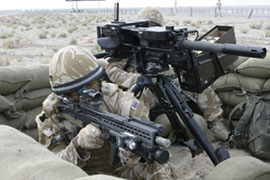Iraq inquiry – another whitewash?
Analysts warn the inquiry could struggle to meet the public’s desire for answers.

 |
| The leaders who led Britain into war will not befound ‘guilty’, commentators say [GETTY/GALLO] |
Britain’s most wide-ranging inquiry into the Iraq war is under way – but in a country where two previous inquiries were branded little more than “establishment whitewash” – is it likely the latest examination will satisfy the public?
The opening of the official inquiry into Britain’s role in the Iraq war began with a promise on Tuesday.
John Chilcot, the former civil servant heading the investigation, pledged that his committee would be “thorough, impartial, objective and fair” in its examination of the six-year conflict.
Along with four other panel members, he has been tasked with examining the reasons Britain entered the war, the equipment and training of forces in Iraq, and the foreign policy and military lessons that can be used by future governments.
Chilcot has insisted that there will be no cover-up and institutions or individuals will face criticism if it is deserved.
Public scepticism
But scepticism remains high among a public left disappointed by the two previous inquiries looking at aspects of the conflict.
In 2004 the Hutton report, which examined the circumstances leading to the death of David Kelly, a former government adviser, was attacked for its lack of criticism of the government and its refusal to investigate its reasons for joining the war.
The Butler report, which followed shortly after, did find that key intelligence used to justify the war in Iraq was unreliable, but did not accuse the government of misleading the public over the reasons for going into war, or apportion blame.
Lindsey German of the Stop the War Coalition believes Chilcot’s inquiry will be no different.
“This is a committee that is founded within the British establishment which will do nothing serious to challenge the British establishment,” she told Al Jazeera.
“It’s not a genuine cross-section of British opinion – it has no anti-war opinion on the committee.”
Anti-war voice
She criticised the inclusions of Lawrence Freedman, an adviser to former British prime minister Tony Blair, Martin Gilbert, a “pro-war historian”, and Sir Roderic Lyne, who took up a post as an advisor to BP, which led a consortium that secured an Iraqi oil contract, on the inquiry’s five-member panel.
|
“It will probably be the most forensic inquiry into Iraq anywhere in the world. We’ve not seen anything like this in the States” Vincent Moss, political editor of the Sunday Mirror newspaper |
“Why shouldn’t a member of the military be a member of the panel, why shouldn’t there be people who opposed the war from the beginning?” German asked.
She believes the decision to hold a public inquiry, rather than a judicial one, is a key failing of the investigation.
“I don’t see the point of having an inquiry if at the end of it is says there is no one to blame for that.”
Her views were echoed by Sabah al-Mukhtar, an Iraqi lawyer and president of the Arab Lawyers’ Association, who has questioned the motives behind the inquiry.
“The government for the first time sets up an inquiry, which it sets out a time limit for … not when it finishes, but not to finish before [the general election]. One can imagine why it is being done this way.
“Certainly this is the most comprehensive [inquiry] … but don’t forget, not many other countries [have seen] their politicians explicitly accused by other politicians of misleading the public and parliament as it happened here.
“Here we would have thought that if somebody of that calibre is accused of this you would have to have a judicial inquiry… not to have just a whitewash, which just looks at the technicalities and the papers.”
‘Massive pressure’
But others remain more positive that the latest investigation can uncover some of the reasoning that led Britain into the much-criticised conflict.
 |
| The inquiry will examine the training and equipping of British forces in Iraq [EPA] |
Vincent Moss, the political editor of Britain’s Sunday Mirror newspaper, believes the inquiry has no choice but to be transparent.
“[Chilcot] is under such massive pressure from the media and the relatives to be as transparent and open as possible, and to be fair to him his opening remarks said that’s what he’s determined to do,” he said.
“Most of it will be public and all the key players are going to be up there and answering questions. It will probably be the most forensic inquiry into Iraq anywhere in the world. We’ve not seen anything like this in the States.
Moss said the new inquiry is likely to knock the Hutton and Butler reports into the shade due to the “deluge” of documentary evidence and “the number of people they’re able to call in”.
‘Detailed scrutiny’
But he cautioned that those who dream of seeing Tony Blair “tried, convicted and dragged off in chains” are likely to be disappointed.
“I think what we’ll end up with is a good look at everything that happened in detailed scrutiny … but for those who hoped it would be some kind of old fashioned English court … those people will claim it’s a whitewash.
“You’ll see a bit of lessons learnt, but if you think there’s going to be a tabloid headline saying ‘Tony Blair guilty as charged’, it’s not going to happen.”
George Eaton, a journalist for Britain’s New Statesman magazine, also believes Chilcot will “not go soft on the government”.
“He’s already ensured that as much of the inquiry as possible will be held in public. so I’m not cynical about this. I think Chilcot will do the job he’s set out to.
But, as Moss points out, the proof of the pudding will be seen in the next few months.